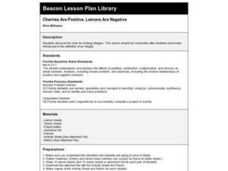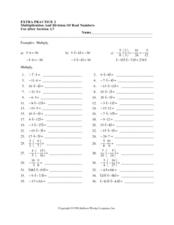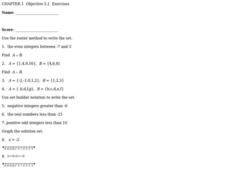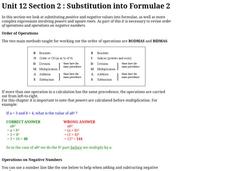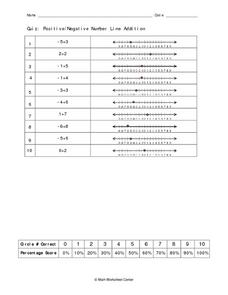Curated OER
Adding & Subtracting (Combining) Integers
Maintain a positive atmosphere in your math class with this fun lesson on adding and subtracting integers. After first explaining the rules for combining positive and negative numbers, this resource uses a comic strip to guide students...
Beacon Learning Center
Cherries Are Positive, Lemons Are Negative
Lemon heads and cherry drops combine for a sweet lesson on positive and negative integers. Following an activity sheet, they use lemon as negative and cherry as positive and follow directions with a partner. An assessment, a rubric, and...
Resource Room
Multisensory Teaching: Positive and Negative Integers
Working with thermometers, sixth graders compare the value of positive and negative numbers. Plenty of teacher suggestions and independent practice ideas are presented. This website links to two more parts in this first of three integer...
California Education Partners
Least and Greatest
Squares can be magic. Pupils use their knowledge of addition of positive and negative rational numbers to create a 3 X 3 magic square where the sums are 1. Scholars create addition and multiplication expressions with a set of rational...
Concord Consortium
Last Digit Arithmetic
Mathematics involves a study of patterns. The exploratory lesson has learners consider the addition pattern in different sets of numbers. Each set has a different pattern that pupils describe mathematically. The patterns involve both...
EngageNY
Mid-Module Assessment Task: Grade 7 Module 2
A seven-question assessment determines how well your learners understand the procedures to add, subtract, multiply, and divide signed rational numbers. Pupils show their understanding through problem-solving situations.
EngageNY
Extending the Domain of Sine and Cosine to All Real Numbers
Round and round we go! Pupils use reference angles to evaluate common sine and cosine values of angles greater than 360 degrees. Once they have mastered the reference angle, learners repeat the process with negative angles.
Curated OER
Multiplication and Division of Real Numbers
In this multiplication and division worksheet, students multiply and divide positive and negative fractions, decimals, and whole numbers. This two-page worksheet contains 72 problems.
Pennsylvania Department of Education
Fractional Parts Using an Area Model
Learners explore multiplying fractions and their relationship to parts of a whole. They draw and shade fractional parts to show parts of a whole and fractional parts of a fraction. Pupils also use an Internet site for interactive practice.
Curated OER
Directed Numbers
In this algebra worksheet, students solve addition problems involving negative nad positive integers. There are 60 problems on this worksheet.
Curated OER
Integers
In this integers worksheet, students solve 10 different problems relating to integers. First, they use the roster method to write each set of even integers. Then, students use set builder notation to write the set of negative integers,...
Curated OER
Go Negative
Fourth graders advance to new levels in the instructional activity we're dealing with here. It is the fourth of a sequence of six dealing with the same theme. These develop from Level 2 to Level 5. In the process they involve number...
Curated OER
Substitution Formula
In this substitution formula learning exercise, learners solve 9 various types of problems related to applying the substitution formula. First, they use a number line to add or subtract negative integers. Then, students substitute...
Curated OER
Hand Washing: I can handle it!
Sixth graders examine microorganisms. In this germs lesson, 6th graders observe and record data on the positive and negative aspects of microorganisms. Students complete activities, view a film, and explore websites.
Curated OER
Exponents: Scientific Notation
In this scientific notation worksheet, 9th graders solve and complete 8 various problems related to exponents and writing scientific notation of numbers. First, they write whole numbers, decimals, and other types of numbers in scientific...
Curated OER
Practice Problems
Students will find the reciprocal of a given number. Students will explain how to get the reciprocal of positive and negative numbers.
Curated OER
Integers
In this integers worksheet, 8th graders solve 10 various types of problems to include rewriting each statement using the convention for Positive integers and then calculate their answer. They also rewrite each statements without the...
Curated OER
Placing Negative Numbers On A Number Line
Fifth graders review the concept of negative numbers and how the are placed on a number line. After the review, 5th graders practice placing negative numbers on a number line in a whole class setting.
Curated OER
Positive/Negative Number Lines Addition Quiz
In this positive/negative number line addition learning exercise, students complete 10 problems. They add positive numbers, negative numbers, or positive to negative numbers using the number lines that are located next to each problem.
Curated OER
Research Lesson
Once you have introduced the concept of comparing positive fractions, use this plan to further understanding. Pupils will start mixing positive and negative fractions through various learning activities. Note: Adapt this lesson plan to...
Curated OER
Rational Numbers
In this rational numbers worksheet, 9th graders solve and complete 12 different problems by dividing each equation. First, they use the division rules given at the top of the sheet to determine how they are going to solve each problems....
Curated OER
My Test Book: Rational and Irrational Numbers
In this online interactive math skills worksheet, students solve 10 multiple choice math problems regarding rational and irrational numbers. Students may submit their answers to be scored.
Curated OER
Finding Smallest Numbers in Sets
For this smallest numbers worksheet, learners circle the smallest number in a set which includes both negative and positive integers, 20 sets total. An answer key is included.
Charleston School District
Evaluation of Roots
You mean the square root of five and five don't have the same value? Learners estimate the value of irrational roots. As they practice estimating the value, they increase their understanding of roots. The lesson is the fourth in a series...



